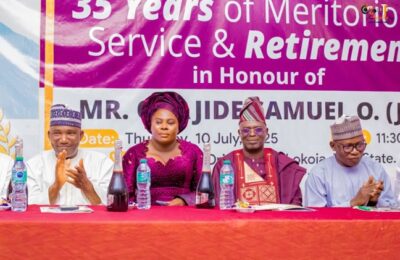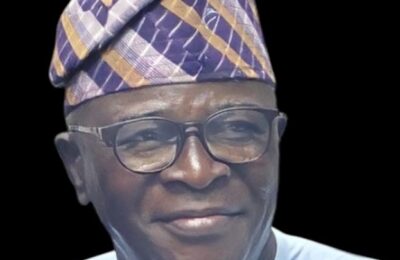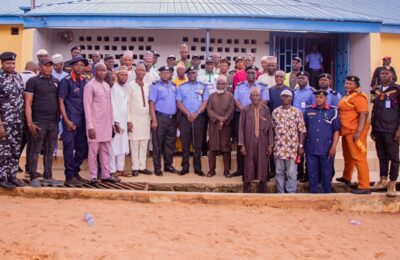It does seem like yesterday, the afternoon of Friday, June 11, 2006 when Okene, the headquarters of the Central Senatorial District of Kogi State indeed wore a solemn look, as the remains of the political godfather of the Ebira Kingdom, Alhaji Ahmed Tijani Ahmed, two time Senator, former Managing Director/Chief Executive Officer, Nigeria Airport Authority (NAA), who died in a ghastly motor accident along Lokoja/Abuja federal highway a day before was buried. The closure of all markets in the city ordered by the monarch, the Ohinoyi of Okene, Dr Ado Ibrahim, who fought back tears as he watched the lifeless body of Ahmed, shortly before he was buried in his father’s compound, highlighted the grief of a people, which is yet to abate, six years after, even as the Ebira, other minorities and indeed, the surviving liberal progressive politicians across the state remember the “lion” of Kogi politics.
Mourners who trooped to Okene from the various part of Nigeria to attend Ahmed’s burial, on short notice, would easily recall how shouts of Allahu Akbar had rented the air at the arrival of the corpse, while various Islamic prayers were rendered after which the Chief Imam of Okene, Alhaji Issa Galadima led the Janaza prayers. And as his corpse was being lifted to his final resting place, mourners, mostly men, openly burst into tears. The infrequent grief underscored what the late Ahmed meant in common to an average Ebira man. He was seen as the strength and a hope for a new dawn for the Ebira nation.
Like the paramount Ebira monarch, Ibrahim, wrote in the condolence register, “He came to the world with a mission to improve the lots of the people he met. He was very restless in his efforts to fulfill his mission. He came; he worked and died working to realise the dream. I pray his dream does not die with him.”
Beyond Ebiraland, the late Ahmed grew in stature to become the symbol of power shift struggle among the minorities scattered across the three senatorial districts. It was therefore not by accident that the spokesman of Okun People’s Forum (OPF), Chief Tunde Olusunle, in a tribute on Monday alluding to, “how time flies with the speed of a meteor”, more or less attributed the inconsistencies in Kogi politics, which are at variance with the dream of the founding fathers of the state to the early departure of the likes of A.T Ahmed from the political radar. Hear him: “It is almost unbelievable that it is six years since the demise of the respected Alhaji A T Ahmed, perhaps the last known unifying political personage from Ebiraland. By some mortal coincidence, the authentic legends of the politics of Igala land and Okunland which, along with the Ebiras constitute the major ethno-cultures of Kogi State , are not physically with us. One is talking here about Dr Stephen Makoji Achema, Chief Sunday Bolorunduro Awoniyi and Chief Silas Bamidele Daniyan.”
Unfortunately, he noted, in the absence of this quartet from their primordial political domains, things have not been the same with the state again. His words: “We therefore only feel a profound sense of nostalgia and pain that in the place of a charismatic leader like Alhaji AT Ahmed in the politics of Ebiraland and indeed Kogi Central, we have spawned impostors, mini-tyrants and virtual modern day Robin Hoods. This is the same situation in Kogi East and Kogi West. Unfortunately, we have produced administrations in quick succession which are very comfortable deploying such characters for their own immediate political ends for a morsel of momentary gratification than the collective good of our people.”
This sorry situation, he lamented, has impacted negatively “on the evolution of an authentic successor generation of leaders to show the way to our people, which explains the suffocating asphyxiation and arrested development we face in our localities, senatorial zones and the state at large.”

Olusunle’s grief would appear to stem from the thick wood of the many failures to actualize the dying dream of what is referred to in some quarters as the “League of Charter of Equity” in the old Kabba Province . Immediately after the creation of Kogi State in 1991, some of the political leaders of the state who came from Kwara State came together to create a charter of power sharing. The late Ahmed was one of them. These group of politicians belonged to the same hue of liberal progressives who believed that since the people of the new state shared some geo-political antecedents before a part of the old Kwara State was excised and merged with Benue, the power equation should be such that would be readily acceptable to the various tribes that constitute the state.
Also in the league of this charter of equity were the late Dr. Stephen Achema, Chief Silas Daniyan and Dr Farouk Abdulaziz.
However, the internal squabbles that rocked their party, the Social Democratic Party (SDP), extinguished their desire of creating a system that would be acceptable to their people as the SDP lost the governorship election to the rival National Republic Convention (NRC), where Chief Sunday B. Awoniyi, Alhaji Abubakar Audu among others held sway. Audu, from the East Senatorial district area of the state, was elected governor and he chose Chief Samuel Akande, from the West Senatorial district as deputy. Their term was however inconclusive as a result of the June 12 Saga and the rest is now history.
When the late General Sani Abacha’s transition programme however started, the question of power shift was brought to the front burner of political discourse in the state.
The argument then was that since the East Senatorial district produced Audu, another district should be allowed to take the shot. The West senatorial district’s arguments had centred on the fact that the Central produced Ahaji Adamu Attah in Kwara, therefore it should be the turn of the West.
On the Eastern flank, the argument was that the term of Audu was inconclusive because it was terminated midstream while the Central believed that the Kogi gubernatorial matter should be started on a clean slate.
Notwithstanding, each of the senatorial districts threw up candidates. In the East were the likes of Audu; Chief Gabriel Adiukwu; Senator Alex Kadiri; late Achema; among others. The Central district had Ahmed and Ambassador Usman Bello. While the west had the former Deputy Chief of Staff in the Presidency, Prince Sola Akanmode; Dr. Stephen Olorunfemi (now late); Alhaji Ahmadu Sheidu (now late); Barrister Justina Abanida; Mrs. Comfort Aiyepeku (now late), among others.
But like the Audu’s term, the transition programme of Abacha was buried with him.
When new parties were registered for the 1999 election, the battle for equity and rotational governorship once again took the front row. Most of the notable politicians crammed into the People’s Democratic Party (PDP). Among these were Awoniyi, Achema, Ahmed, Akanmode, Olorunfemi, Bello , Adukwu, General David Jemibewon, Senator Tunde Ogbeha among many others.
In the rival All People’s Party (before it was re-christened ANPP) were Audu, Daniyan, Kadiri, Sheidu, Abanida, et al.
But irreconcilable disagreements arose within the ranks of the PDP shortly before the election over the choice of Olorunfemi as the governorship candidate. A combination of the late Achema and Ahmed was accused to have overturned the election in favour of Audu, who was re-elected governor for a second term which he completed in 2003.
Audu, however, sought and lost a “third” term in the 2003 general election but was defeated. It is also instructive to note that another politician of eastern extraction, the relatively unknown Ibrahim Idris, was voted into office but this time on the platform of PDP. Idris narrowly defeated Ahmed at the primary held inside the Lokoja Township Cinema, decided via a run-off.
The desire to oust Audu was the major factor that shaped the election particularly in the Western senatorial district where the former governor was perceived as arrogant and a micro-Igala jingoist. But in the Central senatorial district, the desire for a change of governor was intertwined with a decision to replace the governor with an Ebiraman, the platform notwithstanding.
At the general election, Audu led Idris, who flew the PDP flag, with no fewer than two thousand votes in the Eastern senatorial district where they both come from, Alhaji Kabiru Shuaibu of the United Nigeria People’s Party (UNPP) received the majority of votes in the Central more because of the resolution of the district to support equity and rotation while the West, which did not feature any governorship candidate, voted en masse for Idris.
The PDP governorship candidate secured majority of votes in the West primarily because of the determination of a combination of Ogbeha and Akanmode to oust Audu at all cost as indications would later emerge.
Forward march to 2007 poll, a movement for the realisation of equity and rotational power sharing was being assembled among the diverse indigenes of the state under the aegis of Kogi Unity Group. The sole aim of this group, which cuts across the party colouration of the state, was to network within the three senatorial districts and come up with a position that would guarantee power shift.
The group held an inaugural meeting in Abuja at which politicians, professionals, pensioners, teachers, students etc from all the local governments of both the senatorial districts were present and a decision was taken on the need to consult with well meaning people from the Eastern flank on the need to allow the other two senatorial districts to have access to power.
Those involved in this quest particularly from the Central and the West are Ahmed, who was the Chairman of KUG, Ogbeha, Akanmode, the then Health Minister, Eyitayo Lambo, Bello and Nasiru Soso. Other members were the then Nigeria Union of Journalists (NUJ) President, Senator Smart Adeyemi; Senator Muhammed Ohiare; Mr. Jimmy Atte who was of the National Theatre; the then President of Association of Nigerian Authors (ANA), Prof. Olu Obafemi; Professor of Pathology, University of Ilorin, Prof. Anjorin, Chief Funsho Owoyemi who was on National Maritime Authority Board, Chief Victor Faleke (now late} of United Nations Children’s Fund (UNICEF) and Alhaji Deda Atta, a retired director with First Bank.
There were also arguments that a combination of the West and Central local governments would come up with twelve local governments against the nine of the East.
For the conveners, the main issue was the creation of awareness among every Kogite on the need to achieve peaceful co-existence through a conviction that no other person is a second-class citizen of the state. Also, conscious efforts were being made to create crisis-absorbing mechanisms that would cleanse the bickering of the past and quell possible untoward tendencies.
Ahmed who chaired the meeting had declared the joint parley of the minorities as a revolution and all-inclusive: “It is an open thing and it is a normal phenomenon, not strange in Nigeria and in humanity. It is a revolution and it is all-inclusive. There is nothing about it that can be said to be strange, unusual or anti-anybody.”
Ahmed was killed in less than a month after the Abuja declaration in a road accident while on a trip to some parts of Kogi West to hold meetings in furtherance of the KUG agenda. But the struggle did not die with him. Akanmode led a “mass” decamp from PDP to Action Congress in West and Central. But the inability of the likes of Tunde Ogbeha to join up with Akanmode and the cracks that followed the scramble for the AC’s governorship ticket created a setback for the minorities. Ahmed’s successor in the senate from Kogi Central, Muhammed Ohiare, took the baton that eventually saw him teaming up as running mate to Audu in the joint Action Congress/ANPP ticket that failed to unseat Idris in the 2007 polls and practically brought the opposition unto its knees at that point. Idris, there and then earned a second term while most political gladiators who left the PDP for AC gradually crawled back to the ruling party.
The run-up to the December 3, 2011 poll, which was preceded by two primary elections of the ruling PDP, caused disquiet within the ranks of the party in the West and Central Senatorial Districts, as they saw a fresh primary opportunity as an avenue to re-launch their bid for power.
Though, quite a number of aspirants ventured into the race to pick the PDP ticket during the January primary election, which was won by an Igala, Jibrin Isah, one man, who drew the state nearest to changing the political paradigm was Abdulrazaq Kutepa. A minority-minority candidate who hailed from Lokoja minority axis of Kogi West with a historical lineage with Bassa in Kogi East, Kutepa finished a close second in the controversial January 2011 primary, against all odds. But the Appeal Court would later give a ruling extending Ibrahim Idri’s tenure, meaning Isah would have to wait for nine more months to make use of his mandate. In between, another court pronouncement came, this time from the apex court, nullifying extension for Idris. One thing happening after another, the PDP leadership, caught in a constitutional quandary, announced a fresh primary that dealt a fatal blow to Isah’s “mandate” and effectively handed Kutepa a second chance. As expected, Kutepa instantly became the consensus candidate of Kogi West and Central peoples.
Otunba Funsho Owoyemi, a prominent Okun leader had said: “Our desire to have a minority person like Kutepa emerge as the next governor of Kogi State is like a religion. Kutepa exemplifies a unifying factor that can solidify the conglomeration of diverse minority tribes in the state.
Kutepa does not belong to any of the three majority ethnic groups. He is a bridge across all the barriers, so he has no reason not to be fair to all.”
With one voice, elders from West and Central bonded under the auspices of Equity and Peace Contact Group (EPCG) picked Kutepa as the consensus candidate of the two zones. It was the first of its kind since 1991 when the Okun (Yoruba), alongside Lokoja/Kogi and Ebira was excised from the old Kwara State and merged with the Igala/Bassa from old Benue State to form the present day Kogi State .
It was not to be. Idris Wada, a retired pilot who hailed from Dekina Council in Kogi East Senatorial District scored 547 votes (186 more than Isah) to defeat his only opponent, Alhaji Abdulrazaq Kutepa, who polled 296 votes. Ironically, the latter dropped seven votes from his initial showing in January 2011 when he polled 303. Notwithstanding the withdrawal of seven aspirants who contested the January primary from West and Central. The consensus was that Wada’s 547 winning delegates’ votes indicated a shift in the voting pattern that made the January episode a close one; suggesting a change in the attitude of more delegates from West and Central in favour of Wada from the East. Wada went further to win the December 3, 2011 General Election to emerge the fourth democratically elected executive governor of Kogi State. In what played out like a repeat of the 2003 scenario. Yomi Awoniyi from Kogi West emerged Deputy Governor, nominated by Kutepa.
However, it came with a few meanings: 20 years after its creation, Kogi governorship election was still driven by ethnic suspicion and mistrust and the pursuit of sectional interest. It also meant that six years after Ahmed’s departure, his dream was yet unrealised. In fairness to our Igala brothers, Olusunle, shortly after Capt Wada was declared winner of the September 2011 PDP primary blamed the minorities for their woes:
“Despite having the upper hand in terms of micro-political sub-units, electoral wards, provincial administrative units and local government areas, it was evident that the West and Central were not on the same page.The situation where the inability of other sections to discover and deploy the latent energies of their diversity and numbers, once again, had presented the state with the scenario that all the flag bearers for the gubernatorial polls in December 2011 came from the Igala’s Kogi East. The minorities in Kogi, as far as 2012 governorship election was concerned may now look ahead to 2016 for redemption. Something evidently must be wrong with the political mentality of our people”.
The many failures of the power shift struggle will however take nothing away from our memories of Alhaji Ahmed who, beyond politics, lived a low profile for diversity sake. This is why the sixth anniversary commemorating the departure of the great AT Ahmed will continue to have a meaning to us.
– Ralph Agbana is Media Assistant on Research and Documentation to the Executive Governor of Kogi State
Additional reports by Kola Ologbondiyan




